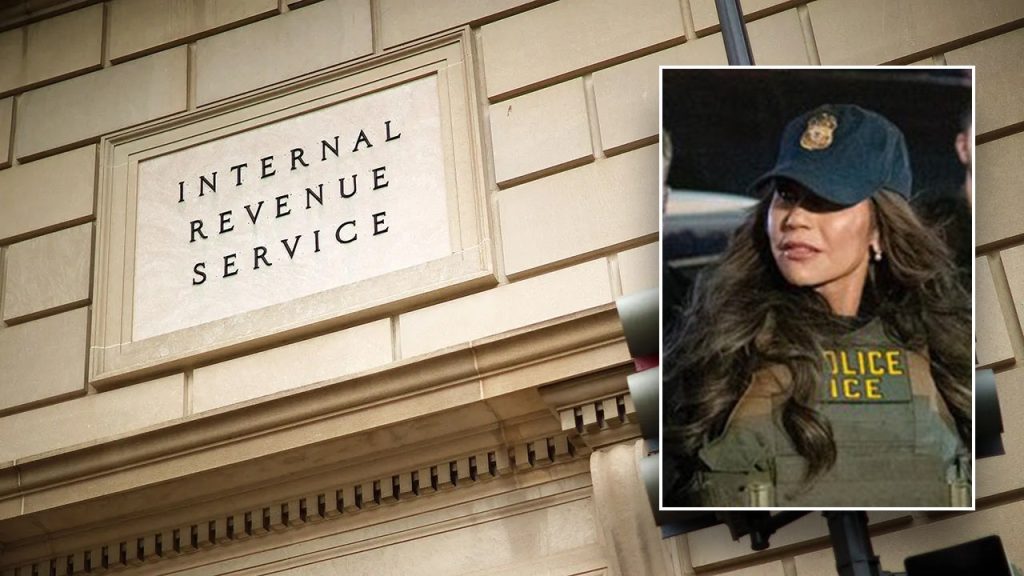The Trump Administration’s Plan to Deputize IRS Agents for Immigration Enforcement
Government Agencies Teaming Up for Immigration Enforcement
The Trump administration is exploring an unprecedented move to involve the Internal Revenue Service (IRS) in immigration enforcement efforts. According to a senior official from the Department of Homeland Security (DHS), the administration is seeking to deputize IRS agents to assist Immigration and Customs Enforcement (ICE) in its operations. This move is part of a broader effort to address illegal immigration and secure the southern border. DHS Secretary Kristi Noem, who signed a letter to Treasury Secretary Scott Bessent, explained that President Trump has directed the agency to take all necessary steps to enforce immigration laws, even if it means deputizing federal employees. The letter is part of Trump’s directive to augment the existing personnel and resources for border security and immigration enforcement.
The proposal highlights the growing collaboration between federal agencies under the Trump administration to achieve its immigration agenda. DHS has already partnered with law enforcement components of the Department of Justice, the Texas National Guard, and the Texas Attorney General’s Office to assist with immigration enforcement. Despite these partnerships, Noem emphasized that more support is needed to fully implement the president’s Executive Order on immigration. The DHS believes that the Department of the Treasury, which oversees the IRS, has qualified law enforcement personnel who can contribute to these efforts.
Why the IRS?
The IRS, traditionally known for its role in tax collection and enforcement, has a dedicated criminal investigations unit that could play a significant role in immigration enforcement. The agency’s criminal investigators are trained to uncover financial crimes such as money laundering, drug trafficking, and corruption, which often overlap with immigration-related offenses. The DHS letter highlights that the IRS workforce and budget have recently increased, making it an opportune time to leverage its resources for immigration enforcement.
By involving the IRS, the administration aims to build complex cases that combine tax, immigration, and money laundering charges. This approach would allow ICE to target employers who engage in unlawful hiring practices, investigate human smuggling and trafficking rings, and seize assets linked to criminal activities. Additionally, IRS agents could assist with contract oversight, apprehensions, detentions, and removals. The move reflects the administration’s strategy to integrate federal agencies into a unified effort to tackle illegal immigration.
A New Role for IRS Agents
The letter from DHS Secretary Noem formally requests that Treasury Secretary Bessent make IRS agents available to work with ICE and consent to their deputization for immigration functions. This would grant IRS agents the authority to perform immigration-related duties alongside ICE. The collaboration would not only enhance ICE’s capabilities but also leverage the IRS’s expertise in financial investigations to dismantle criminal networks that exploit illegal immigration.
While the IRS is primarily tasked with tax enforcement, its criminal investigators are highly skilled in uncovering and prosecuting financial crimes. Their involvement in immigration enforcement could provide a critical link between financial irregularities and immigration violations. For instance, IRS agents could help identify employers who hire undocumented workers and fail to report their income, or uncover money laundering schemes that fund human trafficking operations. By combining tax enforcement with immigration enforcement, the administration hopes to create a more robust framework for addressing illegal immigration.
Implications and Concerns
The plan to deputize IRS agents for immigration enforcement has sparked concerns about the potential overreach of federal agencies and the blurring of lines between their traditional roles. Critics argue that involving the IRS in immigration enforcement could undermine public trust in the agency, particularly among immigrant communities who may already view the IRS with skepticism. Moreover, the move raises questions about the resources and priorities of the IRS, which is primarily tasked with tax collection and enforcement.
Another concern is the potential diversion of IRS resources away from tax-related investigations. While the IRS criminal investigations unit is highly capable, its expertise lies in financial crimes, not immigration enforcement. Critics worry that deputizing IRS agents could distract from their core mission and lead to less effective tax enforcement. Additionally, there are legal and logistical challenges to consider, such as the training and equipping of IRS agents for immigration enforcement roles.
Conclusion: A Bold Move with Far-Reaching Implications
The Trump administration’s proposal to deputize IRS agents for immigration enforcement represents a bold and unconventional approach to addressing illegal immigration. By leveraging the resources and expertise of the IRS, the administration aims to create a more comprehensive and integrated strategy for enforcing immigration laws. While the move could enhance the government’s ability to target criminal networks and employers who exploit undocumented workers, it also raises important questions about the role of federal agencies and the potential impact on public trust.
As the proposal moves forward, it will be important to carefully consider the implications for both immigration enforcement and tax collection. The success of this initiative will depend on the willingness of the Treasury Department to partner with DHS, the training and preparedness of IRS agents, and the public’s response to this new role for the agency. Ultimately, the deputization of IRS agents for immigration enforcement reflects the Trump administration’s commitment to exploring innovative solutions to complex challenges, even as it sparks debate about the appropriate roles of federal agencies in enforcing U.S. laws.












